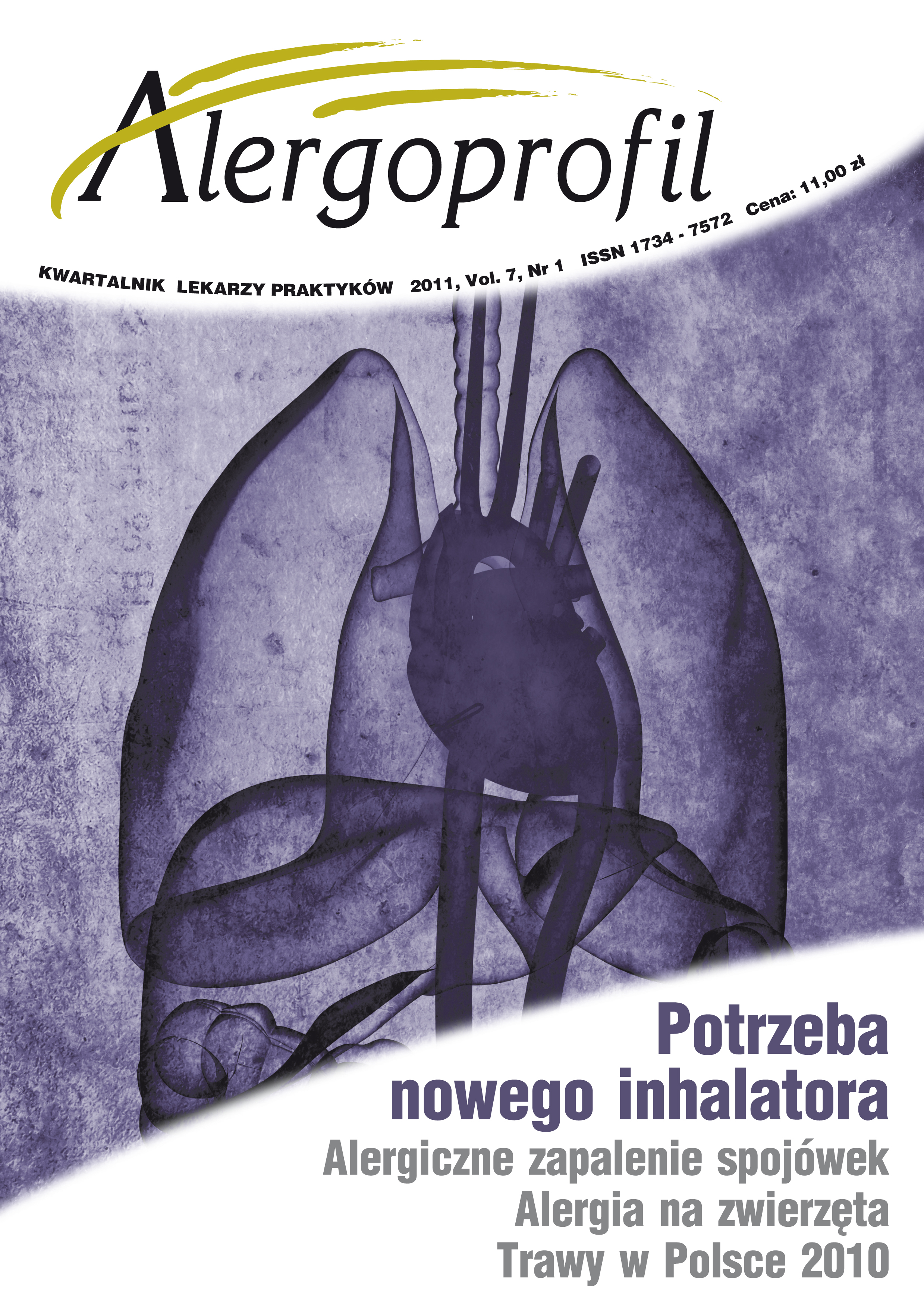To rinse or to moisturize?
Main Article Content
Abstract
Day-to-day ENT practice offers evidence of beneficial effects of nasal douching with sea water solutions. The authors present their own experience and literature review concerning the role of nasal saline irrigations in practice. The topical saline could be used as a treatment adjunct in the symptoms of acute and chronic rhinosinusitis and allergic rhinitis that enhances the effect of treatment, improves the quality of life and is well tolerated.
Downloads
Article Details
Copyright: © Medical Education sp. z o.o. This is an Open Access article distributed under the terms of the Attribution-NonCommercial 4.0 International (CC BY-NC 4.0). License (https://creativecommons.org/licenses/by-nc/4.0/), allowing third parties to copy and redistribute the material in any medium or format and to remix, transform, and build upon the material, provided the original work is properly cited and states its license.
Address reprint requests to: Medical Education, Marcin Kuźma (marcin.kuzma@mededu.pl)
References
2. Harvey R., Hannan S.A., Badia L., Scadding G.: Nasal saline irrigation forthe symptoms of chronic rhinosinusitis (Review). Cochrane Database of Systemic Reviews 2007, 3: CD006394. Online: DOI: 10.1002/14651858. CD006394.pub2 .
3. Fokkens W., Lund V., Mullol J.: European Position Paper on Rhinosinusitis and Nasal Polyps 2007. Rhinology 2007, suppl. 20.
4. Klossek J.M., Chidac C., Serrano E.: Current position of the management of community – acquired acute maxillary sinusitis or rhinosinusitis in France and literature review. Presse Med. 2005, 34(22): 1755-63.
5. Kassel J.C., King D., Spurling G.K.P.: Saline nasal irrigation for acute upper respiratory tract infections. Cochrane Database of Systematic Reviews 2010,Issue 3: Art.No.:CD006821. Online: DOI: 10.1002/14651858.CD006821.pub2].
6. Slapak I., Skoupa J., Strnad P., Hornik P.: Efficacy of Isotonic nasal Wash (Seawater) in the Treatment and Prevention of Rhinitis in Children. Arch. Otolaryngol. Head Neck Surg. 2008, 134(1): 67-74.
7. Rapiejko P.: Leczenie ostrego zapalenia zatok przynosowych. Alergoprofil 2008, 4(3): 11-17.
8. Rapiejko P., Jurkiewicz D.: Hipertoniczny roztwór wody morskiej we wspomaganiu leczenia zapalenia zatok przynosowych. Alergoprofil 2009, 5(2): 27-37.
9. Tamooka L.T., Murphy C., Davidson T.M.: Clinical study and literature review of nasal irrigation. Laryngoscope 2000, 110: 1189-1193.
10. Rapiejko P.: Roztwory wody morskiej w praktyce laryngologicznej i alergologicznej. Alergoprofil 2008, 1: 37-39.
11. Rapiejko P., Jurkiewicz D.: Zastosowanie hipertonicznego roztworu wody morskiej u chorych po leczeniu operacyjnymosa i zatok przynosowych. Otolaryngol. Pol. 2010, 64(1): 20-30.
12. Kim C.H., Hyun Song M., Eun Ahn Y., Lee J.G., Yoon J.H.: Effect of hypo-, iso- and hypertonic saline irrigation on secretory mucins and morphology of cultured human nasal epithelial cells. Acta Otolaryngol. 2005, 125(12): 1296-300.
13. Tomooka L.T., Murphy C., Davidson T.M.: Clinical study and literature review of nasal irrigation. Laryngoscope 2000, 110(7): 1189-93.
14. Rabago D., Guerard E., Bukstein D.: Nasal irrigation for chronic sinus symptoms in patients with allergic rhinitis, asthma, and nasal polyposis: a hypothesis generating study. WMJ 2008, 107(2): 69-75.
15. Papsin B., McTavish A.: Saline nasal irrigation: Its role as an adjunct treatment. Can. Fam. Physician. 2003, 49: 168-73.
16. Tano L., Tano K.: A daily nasal spray with saline prevents symptoms of rhinitis. Acta Oto-Laryngologica 2004, 124(9): 1059-1062.
17. Dżaman K., Jadczak M., Rapiejko P., Jurkiewicz D.: Ocena stanu błony śluzowej jamy ustnej i jamy nosowej pracowników wysypiska śmieci i zakładu gospodarki komunalnej. Ann. Univ. Marie Curie-Skłodowska Sec. D Med. 2006, 60(Suppl. XVI): 44-47.
18. Rapiejko P.: Can use of symptomatic drugs negatively affect the course of an allergic disease? Ann. Univ. Marie Curie-Skłodowska Sec. D Med. 2007, 62(Suppl. XVIII, 7): 9-11.
19. Talbot A., Herr T., Parsons D.: Mucociliary clearance and buffered hypertonic saline solution. Laryngoscope 1997, 107(4): 500-503.
20. Beek W., Keles N., Graamans K., Huzing E.: Physiologic and hypertonic saline solutions impair ciliary activity in vitro. Laryngoscope 1999, 109(3): 396-399.
21. Rapiejko P., Jurkiewicz D.: Wpływ stosowania roztworu izotonicznego wody morskiej (Marimer) na objawy chorobowe oraz stan błony śluzowej nosa u chorych z uczuleniem na alergeny pyłku roślin. Alergoprofil 2007, 3(4): 29-35.
22. Wormald P.J., Oates L., Hawke L., Wong I.: A comparative study of three methods of nasal irrigation. Laryngoscope 2004, 114: 2224-2227.

